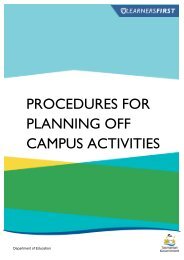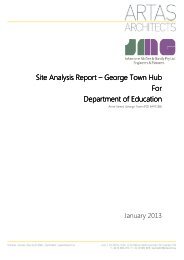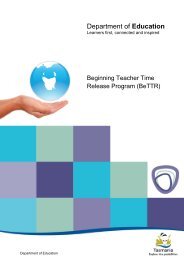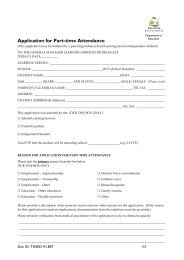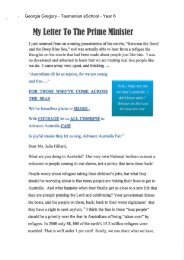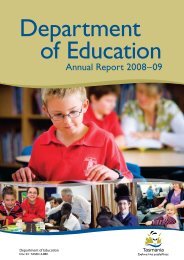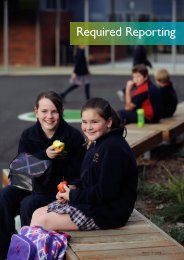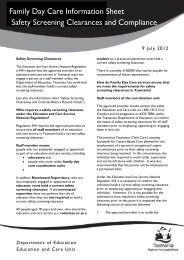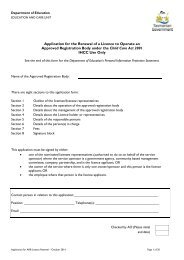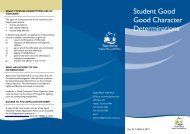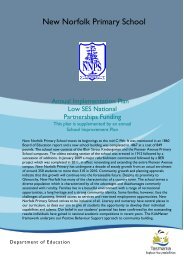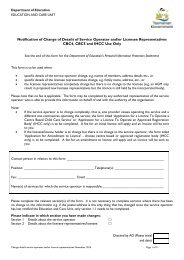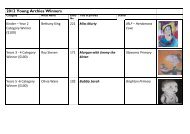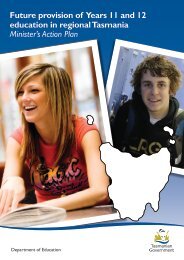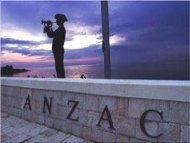Education
DoE Annual Report 2012-2013 - Department of Education
DoE Annual Report 2012-2013 - Department of Education
- No tags were found...
Create successful ePaper yourself
Turn your PDF publications into a flip-book with our unique Google optimized e-Paper software.
LiL acknowledges the important role of parents as their<br />
child’s first and often most influential teacher and seeks<br />
to work in partnership with them to ensure a positive<br />
transition for their child into Kindergarten.<br />
Children are born ready to learn and engage in the world<br />
around them and their early experiences are critical in<br />
their ongoing development. A child’s early experiences can<br />
either provide a solid or fragile foundation and influence<br />
the extent to which they can reach their full potential.<br />
Providing support and intervention for children prior to<br />
commencement of school is more likely to be effective<br />
than interventions later in life.<br />
LiL provides opportunities for teachers, parents and<br />
children to play and learn together in a variety of ways<br />
such as music sessions, water awareness programs,<br />
baby massage, out and about in their local community,<br />
Parents and Children Together playgroups and physical<br />
activities such as baby and toddler ‘gym’.<br />
LiL continues to strengthen partnerships with other<br />
agencies as schools seek to meet the needs of families in<br />
their local community. Partnerships continue to be built<br />
between schools, child and family centres, Child Health<br />
and Parenting Services, Housing Tasmania, Child and<br />
Adolescent Mental Health Services and Centrelink.<br />
Launching into Learning good practice example<br />
Partnerships at<br />
Ravenswood<br />
Heights<br />
Primary<br />
School and<br />
Ravenswood<br />
Child and<br />
Family Centre<br />
The Ravenswood Child and Family Centre and<br />
Ravenswood Heights Primary School have strengthened<br />
their ties through a new initiative in 2012 called<br />
Parents and Children Together (PACT).<br />
Early years staff from the school and the centre<br />
participated in the Parents as Active Companions in<br />
Children’s Learning (PaAC) training. The training course<br />
was developed by the state Early Years team following<br />
their involvement in professional learning supported by<br />
the Tasmanian Early Years Foundation (delivered by staff<br />
from The Pen Green Centre in the UK in 2012). PaAC<br />
provides a framework for working in partnership with<br />
parents to deepen understandings about young children’s<br />
learning and development. It is a way of working which<br />
involves respecting the knowledge of parents about their<br />
own children and working with parents in a ‘knowledge<br />
sharing approach’. It is designed to promote a culture of<br />
parents and staff working together as co-educators and<br />
strongly connects with Belonging, Being and Becoming:<br />
the Early Years Learning Framework for Australia.<br />
In particular, it connects with the principles of secure,<br />
respectful and reciprocal relationships; and partnerships.<br />
At the Ravenswood Child and Family Centre the<br />
Launching into Learning teacher, assistant principal,<br />
centre leader, teacher assistant, parents and children<br />
come together at a weekly playgroup called PACT.<br />
At PACT individual children are videoed by one of the<br />
staff while they are playing and interacting with others<br />
and the learning environment. The following week the<br />
footage is viewed with the parents. The staff member<br />
and parent/s talk together about what they notice in<br />
the video focusing on the child’s level of involvement<br />
or wellbeing; the relationship between the parent and<br />
child and/or learning resources. The parent/s then<br />
select some photos from the video and record their<br />
thoughts from the conversation. This is subsequently<br />
developed into a portfolio which the parents<br />
take home.<br />
Working this way has strengthened relationships<br />
between staff and parents. The PACT group is growing<br />
and seems particularly effective in engaging families<br />
who are not so involved in other groups in the centre.<br />
The conversations about children’s learning are deeper<br />
and more focused with a common language and<br />
understanding developing about children’s wellbeing,<br />
involvement and relationships. This two-way sharing<br />
allows for more individualised planning for children.<br />
This includes talking with parents about what the child<br />
is like at home and how they can be supported in<br />
providing other play experiences both at home and<br />
during playgroup.<br />
Whilst PACT is a new initiative, the enjoyment of<br />
talking about young children and their learning is<br />
spreading to other parts of the school and child and<br />
family centre communities in Ravenswood.<br />
Pre-Compulsory and Compulsory <strong>Education</strong> » Early Years<br />
25



